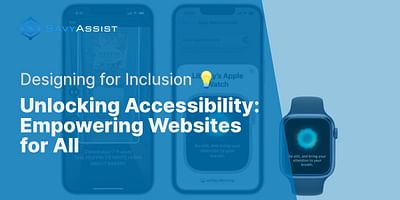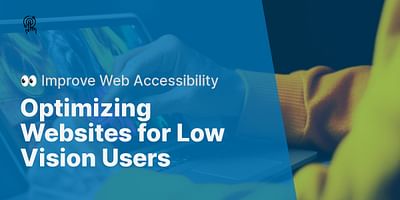Alessandra is a proficient software developer with a burning passion for creating user-friendly technology specifically designed for individuals with disabilities. She possesses extensive experience working on projects that utilize machine learning to enhance accessibility. Alessandra continually seeks innovative approaches to make technology a more inclusive space.
Making your website accessible is not only the right thing to do, but it also brings numerous benefits to both your users and your business. Accessibility ensures that people with disabilities can access and use your website effectively, providing them with equal opportunities to engage with your content, products, and services. Here are some key reasons why website accessibility is important:
1. Inclusivity and Equal Access: By making your website accessible, you are ensuring that people with disabilities can fully participate in the digital world. It promotes inclusivity and equal access to information, services, and opportunities for everyone, regardless of their abilities.
2. Legal and Ethical Obligations: Many countries have laws and regulations in place that require websites to be accessible. By complying with these regulations, you avoid potential legal issues and demonstrate your commitment to ethical business practices.
3. Expanded Reach and User Base: There are over a billion people worldwide with disabilities, and they represent a significant market segment. By making your website accessible, you tap into this audience and expand your potential user base. Additionally, accessible websites are often preferred by all users, including those without disabilities, as they provide a better user experience.
4. Improved SEO and Search Rankings: Accessible websites tend to have better search engine optimization (SEO) and higher search rankings. Search engines, like Google, prioritize websites that are accessible and user-friendly, resulting in increased visibility and organic traffic to your site.
5. Enhanced Usability and User Experience: Accessibility features, such as high contrast colors, clear navigation, and alternative text for images, benefit all users. These features improve the overall usability and user experience of your website, making it easier to navigate, understand, and interact with your content.
6. Future-Proofing: By implementing accessible design principles and practices, you future-proof your website. As technology evolves, your website will be better equipped to adapt to new devices, platforms, and assistive technologies, ensuring its longevity and relevance.
7. Positive Brand Image and Reputation: Demonstrating a commitment to accessibility sends a strong message about your brand values and social responsibility. It enhances your reputation and fosters positive relationships with customers, employees, and the wider community.
8. Compliance with WCAG Guidelines: The Web Content Accessibility Guidelines (WCAG) provide a set of internationally recognized standards for web accessibility. By making your website accessible, you align with these guidelines, which are widely accepted as best practices in the industry.
In conclusion, making your website accessible is not only a legal and ethical obligation but also a strategic business decision. It ensures inclusivity, expands your user base, improves SEO, enhances usability, future-proofs your website, and strengthens your brand image. By prioritizing accessibility, you create a more inclusive and user-friendly web for all.















